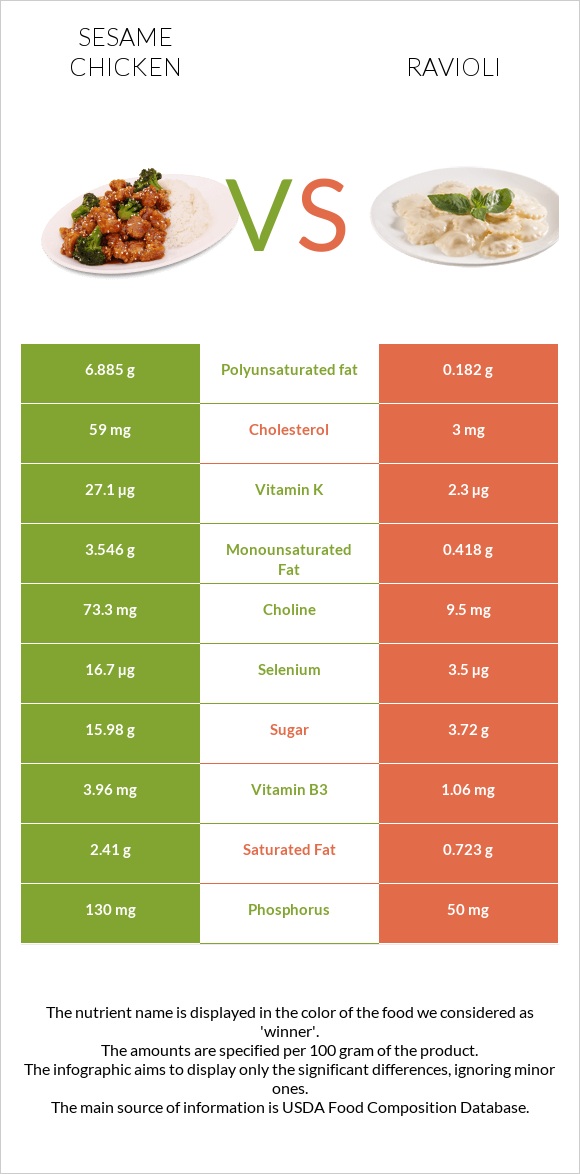Sesame chicken vs. Ravioli — In-Depth Nutrition Comparison
Compare
Important differences between sesame chicken and ravioli
- Sesame chicken has more selenium, vitamin K, vitamin B3, vitamin B6, choline, phosphorus, vitamin B2, and vitamin B12; however, ravioli has more copper.
- Sesame chicken's daily need coverage for selenium is 24% more.
- Sesame chicken has 20 times more cholesterol than ravioli. Sesame chicken has 59mg of cholesterol, while ravioli has 3mg.
The food varieties used in the comparison are Restaurant, Chinese, sesame chicken and Ravioli, cheese-filled, canned.
Infographic

Infographic link
Mineral Comparison
Mineral comparison score is based on the number of minerals by which one or the other food is richer. The "coverage" charts below show how much of the daily needs can be covered by 300 grams of the food.
| Contains more MagnesiumMagnesium | +46.7% |
| Contains more IronIron | +47.3% |
| Contains more ZincZinc | +152.8% |
| Contains more PhosphorusPhosphorus | +160% |
| Contains more SeleniumSelenium | +377.1% |
| Contains more CalciumCalcium | +175% |
| Contains more PotassiumPotassium | +13.7% |
| Contains more CopperCopper | +178.4% |
| Contains less SodiumSodium | -36.5% |
| Contains more ManganeseManganese | +112% |
Vitamin Comparison
Vitamin comparison score is based on the number of vitamins by which one or the other food is richer. The "coverage" charts below show how much of the daily needs can be covered by 300 grams of the food.
| Contains more Vitamin CVitamin C | +∞% |
| Contains more Vitamin AVitamin A | +730% |
| Contains more Vitamin EVitamin E | +54.1% |
| Contains more Vitamin DVitamin D | +∞% |
| Contains more Vitamin B2Vitamin B2 | +181.3% |
| Contains more Vitamin B3Vitamin B3 | +273.6% |
| Contains more Vitamin B6Vitamin B6 | +161.8% |
| Contains more Vitamin B12Vitamin B12 | +733.3% |
| Contains more Vitamin KVitamin K | +1078.3% |
| Contains more Vitamin B1Vitamin B1 | +85% |
| Contains more FolateFolate | +150% |
All nutrients comparison - raw data values
| Nutrient |  |
 |
DV% diff. |
| Polyunsaturated fat | 6.885g | 0.182g | 45% |
| Protein | 14.33g | 2.48g | 24% |
| Selenium | 16.7µg | 3.5µg | 24% |
| Vitamin K | 27.1µg | 2.3µg | 21% |
| Fats | 14.25g | 1.45g | 20% |
| Cholesterol | 59mg | 3mg | 19% |
| Vitamin B3 | 3.96mg | 1.06mg | 18% |
| Vitamin B6 | 0.267mg | 0.102mg | 13% |
| Choline | 73.3mg | 9.5mg | 12% |
| Calories | 293kcal | 77kcal | 11% |
| Phosphorus | 130mg | 50mg | 11% |
| Vitamin B2 | 0.225mg | 0.08mg | 11% |
| Copper | 0.051mg | 0.142mg | 10% |
| Vitamin B12 | 0.25µg | 0.03µg | 9% |
| Sodium | 482mg | 306mg | 8% |
| Vitamin A | 83µg | 10µg | 8% |
| Saturated fat | 2.41g | 0.723g | 8% |
| Monounsaturated fat | 3.546g | 0.418g | 8% |
| Zinc | 0.91mg | 0.36mg | 5% |
| Vitamin B5 | 0.272mg | 5% | |
| Carbs | 26.88g | 13.64g | 4% |
| Iron | 1.09mg | 0.74mg | 4% |
| Starch | 10.7g | 4% | |
| Manganese | 0.083mg | 0.176mg | 4% |
| Vitamin E | 1.31mg | 0.85mg | 3% |
| Vitamin B1 | 0.04mg | 0.074mg | 3% |
| Folate | 8µg | 20µg | 3% |
| Fructose | 2.01g | 3% | |
| Magnesium | 22mg | 15mg | 2% |
| Calcium | 12mg | 33mg | 2% |
| Fiber | 0.7g | 1.3g | 2% |
| Vitamin C | 1mg | 0mg | 1% |
| Vitamin D | 5 IU | 0 IU | 1% |
| Potassium | 204mg | 232mg | 1% |
| Vitamin D | 0.1µg | 0µg | 1% |
| Net carbs | 26.18g | 12.34g | N/A |
| Sugar | 15.98g | 3.72g | N/A |
| Trans fat | 0.045g | N/A | |
| Omega-3 - EPA | 0.003g | 0g | N/A |
| Omega-3 - DHA | 0.005g | 0g | N/A |
| Omega-3 - ALA | 0.774g | N/A | |
| Omega-3 - DPA | 0.006g | 0g | N/A |
| Omega-3 - Eicosatrienoic acid | 0.001g | N/A | |
| Omega-6 - Gamma-linoleic acid | 0.039g | N/A | |
| Omega-6 - Dihomo-gamma-linoleic acid | 0.009g | N/A | |
| Omega-6 - Eicosadienoic acid | 0.009g | 0g | N/A |
| Omega-6 - Linoleic acid | 5.925g | N/A |
Macronutrient Comparison
Macronutrient breakdown side-by-side comparison
Protein:
14.33 g
Fats:
14.25 g
Carbs:
26.88 g
Water:
42.8 g
Other:
1.74 g
Protein:
2.48 g
Fats:
1.45 g
Carbs:
13.64 g
Water:
80.91 g
Other:
1.52 g
| Contains more ProteinProtein | +477.8% |
| Contains more FatsFats | +882.8% |
| Contains more CarbsCarbs | +97.1% |
| Contains more OtherOther | +14.5% |
| Contains more WaterWater | +89% |
Fat Type Comparison
Fat type breakdown side-by-side comparison
Saturated fat:
Sat. Fat
2.41 g
Monounsaturated fat:
Mono. Fat
3.546 g
Polyunsaturated fat:
Poly. Fat
6.885 g
Saturated fat:
Sat. Fat
0.723 g
Monounsaturated fat:
Mono. Fat
0.418 g
Polyunsaturated fat:
Poly. Fat
0.182 g
| Contains more Mono. FatMonounsaturated fat | +748.3% |
| Contains more Poly. FatPolyunsaturated fat | +3683% |
| Contains less Sat. FatSaturated fat | -70% |





